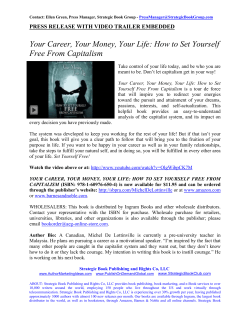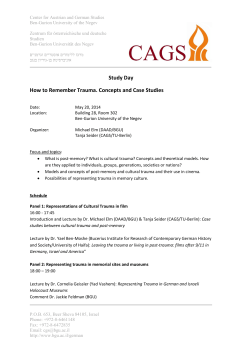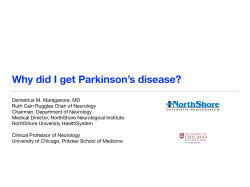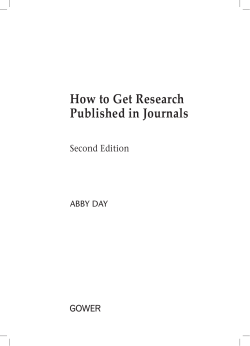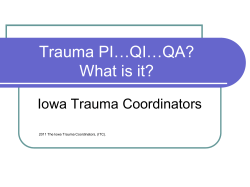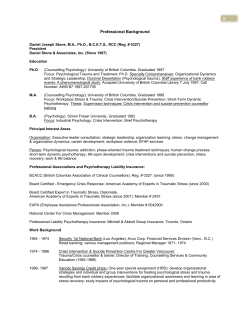
Document 211358
The Twelve Greatest Mistakes Therapists Make ! ! 1. Practicing therapy when you are not healthy is not fair to your client—license or no license. ! 2. Having poor boundaries and relationship skills or knowledge how to have a clean =ight will cause you to misrepresent yourself and give bad advice. ! ! 3. Having a weak theoretical background will create blind spots in perception. A. You must understand the critical causes of personality in childhood from killers to saints. B. You need to understand the importance of attachment theory, trauma theory and family systems or interaction theory in resilience and creating personality. C. You need to be aware of theoretical issues of our culture: a. The motives and rami=ications in believing in beliefs in genetics b. The myths, public relations and faulty research supporting genetics c. The in=luence of the pharmaceutical industry on research d. The in=luence of the medical model on treatment e. The in=luence of the women’s movement on daycare for infants ! ! ! ! ! ! ! ! ! ! ! ! 4. Lack of correct parenting information and failure to warn pregnant parents to do whatever they can to stay home the =irst three years 5. Failure to recognize the causes of children’s acting out behaviors or to refer to an expert 6. Failure to understand clearly how the body works to heal emotional trauma 7. Failure to understand how wrong beliefs impact the healing process 8. Failure to understand the difference between assessment and judgment 9. Failure to understand the ethics of mental health 10. Failure to understand the impact of repression has on mental health 11. Failure to consult when you are over your head. 12. We become overly invested in con=identiality so that we unconsciously lead our clients into a secretive lifestyle instead of an open one. ! ! ! How to Assess a Therapist ! If I were in your shoes, I’d ask these questions and look for answers similar to what I offer after each question. ! Do you believe a therapist has to have good mental health? Yes. (Watch out for a hesitation.) ! What do you think of putting an infant or toddler in daycare? It’s a bad idea if you can avoid it. If you can’t avoid it try to make up for it any way possible (extra time, extra quality, extra understanding). ! How do you handle a disagreement? I never quit in the middle of an issue. I try to stick it out. I try to listen and understand. I try to explain my point in a respectful way. ! What percent of a person’s behavior do you attribute to genetics? Very little, if any. ! Do you judge your clients? No, I try to understand them. ! Do you judge their behaviors? I believe bad behaviors are the result of a lack of mental health. I think it is important to teach healthy ethics sometime. Lots of times a change in ethics improves mental health. ! How do you determine right and wrong? My primary consideration is whether or not my actions can ultimately and predictably hurt someone. I hold others to the same standard. I treat bad behavior like addiction. I won’t enable it. ! Do you give advice that a good parent would give a child? Yes. Everybody should have had good parenting. It’s never to late for guidance. ! What are the most important issues in parenting? Attachment, safety, coaching, only disciplining a child who feels cherished, learning self-‐ regulation, consistency of discipline, personal responsibility and providing safety to a child to tell the truth of one’s feelings and thoughts, as long as it is respectful. ! If I ask a relevant question will you answer it? Yes, of course. ! ! Do you believe it’s important to understand the impact of childhood trauma? Yes, of course. ! ! ! How to Get Causal Therapy When there Are None Around ! When it’s legal for a California therapist (coming soon?) to Skype out of state of the country, it will be easier. Still, you will need to address the issue of couchwork. You can get instructions from The Manual, but you do need a witness. ! You may want to use “How to Assess a Therapist” in order to interview therapists. ! Some therapists are amenable to reading The Manual and applying the principles to their work with you. They may need to talk about the concepts with you, if you are appreciating something out of their “wheel house”. A really good therapist won’t need to be the expert at all times, but you must give them respect, especially if you are to grow. ! This is an invitation to any therapist who has read The Manual or watched the tapes to notify us their name, of=ice address, email and/or phone number. ! ! ! ! ! Critical Reading List ! I wanted to present a reading list of the thirty most game-‐changing books of which I know, so a reader could =ill out their theoretical understanding in the most ef=icient possible way. It was a painful pruning process. A more complete list of the books that have aided my theoretical understanding of behavior are in the References section of my books. I have represented many of these essential texts in the books I have written. So, for these reasons I have 29 books on this list, =ive of which are mine, written for this very purpose to =ill in the holes as ef=iciently as possible. I have included another eighteen articles. I have bolded my eleven most favorite books. ! Articles Barker, Elliott (2000). The critical importance of mothering [Online]. Available: www.naturalchild.com/elliott_barker/mothering.html Belsky, J. (1986). Infant day care: a cause for concern? Zero to Three. Washington, D.C.: Bulletin of the National Center for Clinical Infant Programs. Bulletin of the National Center for Clinical Infant Programs, VI(5). DeGrandpre, Richard J., and Hinshaw, Stephen P. (2000). ADHD: Serious Psychiatric Problem or AllAmerican Cop-out? Cerebrum: The Dana Forum on Brain Science, 12-38. ! Galves, Albert, et al. (2002). Debunking the Science Behind ADHD as a Brain Disorder, www.prozactruth.com/article_debunking.htm. Harlow, Harry F., and Zimmermann, Ronald R. (1959). Affectional responses in the infant monkey. Science, 130, 421. Prescott, James (2000). Birth and the Origins of Violence: Perspectives on Violence [Online]. Available: http://www.birthpsychology.com/violence/prescott.html LeDoux, J. E.; Romanski, L., & Xagoraris, A. (1991). Indelibility of subcortical emotional memories. Journal of Cognitive Neuroscience, 1, 238-243. Lipton, Bruce (2001). Nature, Nurture and Human Development. www.brucelipton.com. _____ (2001a). “Evolution by BITs and Pieces: An Introduction to Fractal Evolution.” www.brucelipton.com. _____ (2001b). “Insight into Cellular ‘Consciousoness.’” www.brucelipton.com Los Angeles Times, “Mac Martin Verdict,” January 8, 1990. Perry, Bruce (2000). The Neuroarcheology of Childhood Maltreatment [Online]. Available: http:// www.bcm.tmc.edu/cta/Neuroarcheology.htm Spitz, Rene A. (1949). The Role of Ecological Factors in Emotional Development in Infancy. Child Development, 20(3): 145-155. ! Teicher, Martin (2002, March). Scars That Won’t Heal: The Neurobiology of Child Abuse: Maltreatment at an early age can have enduring negative effects on a child’s brain development and function. Scientific American. Schwartz, P. (1983). Length of day-care attendance and attachment behavior in eighteen-month-old infants. Child Development, 54. Shore, A. (2001). The Effects of Early Relational Trauma on Right Brain Development, Affect Regulation, and Infant Mental Health. Infant Mental Health Journal, 22, 201-269. Summit, Rolland (1983). The Child Sexual Abuse Accommodation Syndrome. Child Abuse & Neglect, Vol. 7, pp. 177-193. van der Kolk, Bessel, et al. (1994a). The Body Keeps The Score: Memory and the Evolving Psychobiology of Post Traumatic Stress [Online]. Available: Trauma Information Pages: http:\ \www.trauma-pages.com Winnicott, Donald (1958). Primary Maternal Preoccupation (1956). Collected Papers: Through Pediatrics to Psycho-Analysis. New York: Basic Books. ! Books Bowlby, John (1988). A Secure Base. London: Basic Books. Breggin, Peter (1991) Toxic Psychiatry. New York: St. Martin’s Press. ____ (2008). Medication Madness: The Role of Psychiatric Drugs in Cases of Violence, Suicide, and Crime. New York: St. Martin’s Griffin. Breggin, Peter & Cohen, David (1999). Your Drug May Be Your Problem: How and Why to Stop Taking Psychiatric Medications. New York: Perseus Publishing. Calfaro, John V. and Conn-Calfaro, Allison (1998). Sibling Abuse Trauma: Assessment And Intervention Strategies for Children, Families, and Adults. New York: The Haworth Maltreatment and Trauma Press: Binghamton, NY. ! Colbert, Ty (2000). Rape of the Soul: How the Chemical Imbalance Mode of Modern Psychiatry has Failed Its Patients. Tustin, CA: Kevco Publishing. ! _____ ((1997). Broken Brains or Wounded Hearts: What Causes Mental Illness? Tustin, CA: Kevco Publishing. ! Joseph, Jay (2004). The Gene Illusion: Genetic Research in Psychiatry and Psychology Under the Microscope. New York: Algora Publishing. _____ (2006). The Missing Gene: Psychiatry, Heredity and the Fruitless Search for Genes. New York: Algora Publishing. Karr-Morse, Robin and Wiley, Meredith S. (1997). Ghosts from the Nursery: Tracing the Roots of Violence. New York: Atlantic Monthly Press. Lewis, Dorothy Otnow (1998). Guilty by Reason of Insanity. New York: Ballantine Publishing Group. Lewontin, Richard (1991). Biology as Ideology: The Doctrine of DNA, previously The Dream of the Human Genome. New York: HarperPerennial. Lewontin, Richard; Rose, Steven; and Kamin, Leon J. (1984). Not in Our Genes: Biology, Ideology, and Human Nature. New York: Pantheon Books. Masson, Jeffrey (1984). The Assault on Truth: Freud’s Suppression of the Seduction Theory. New York: Simon & Schuster. Miller, Alice (1983). For Your Own Good. New York: Noonday Press. _____ (1984). Thou Shalt Not Be Aware: Society’s Betrayal of the Child. New York: Basic Books. _____ (1988). Banished Knowledge: Facing childhood Injuries. New York: Bantam Doubleday Dell Publishing Group, Inc. _____ (2001). The Truth Will Set You Free: Overcoming Emotional Blindness and Finding Your True Adult Self. New York: Basic Books. Peck, M. Scott (1983). People of the Lie: The Hope for Healing Human Evil. New York: Simon & Schuster. Ross, Colin A. & Pam, Alvin (1995). Pseudoscience in Biological Psychiatry: Blaming the Body. New York: John Wiley & Sons. Rothschild, Babette (2000). The Body Remembers: The Psychophysiology of Trauma and Trauma Treatment. New York: W. W. Norton & Company. Ruskan, John (1993). Emotional Clearing: Releasing Negative Feelings and Awakening Unconditional Happiness. New York: R. Wiley & Co. Siegel, D.J. (1999) The Developing Mind: Toward a Neurobiology of Interpersonal Experience. New York, London: Guilford Press. ! Snyder, Faye (2012). The Manual: The Definitive Book on Parenting and the Causal Theory. Los Angeles: Clifton Legacy Publishing. ! _____ (2013). Healing Your RAD Child. Los Angeles: Clifton Legacy Publishing. ! _____ (2013). ADHD: A Diagnosis in Denial. Los Angeles: Clifton Legacy Publishing. ! _____ (2014). The Politics of Memory: When One Is Instructed to Shut the Eyes. Los Angeles: Clifton Legacy Publishing. ! _____ (2014). The Predictor Scale: Predicting and Understanding Behavior according to Critical Childhood Experiences. Los Angeles: Clifton Legacy Publishing. ! van der Kolk, Bessel; McFarlane, Alexander; Weisaeth, Lars (eds.) (1996). Traumatic Stress: the Effects of Overwhelming Experience for Mind, Body & Society. New York: Guilford Press. Whitaker, Robert (2002). Mad in America: Bad Science, Bad Medicine, and the Enduring Mistreatment of the Mentally Ill. New York: Basic Books. ! ! ! Videos Thomas, Nancy (1998). Rebuilding the Broken Bond, Part I for Reactive Attachment Disorder [video]. Glenwood Springs, CO: Nancy Thomas. Timmons v. Indiana, 584 N.E. 2nd 1108 (Ind. 1992). ! ! ! !
© Copyright 2025


